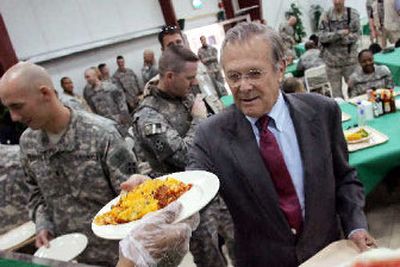Rumsfeld, Rice bring support

BAGHDAD, Iraq – Symbolism speaks volumes in the world of diplomacy. So the mere sight of America’s top two foreign policy officials calling on Iraq’s new leaders sent the message loud and clear – we’re behind you and we want your government to succeed.
And in case the subtext of Wednesday’s unannounced visit by Secretary of State Condoleezza Rice and Defense Secretary Donald Rumsfeld was unclear, the top U.S. military commander on the scene spelled it out. Army Gen. George Casey, the top U.S. military commander, said Iraq’s success in forming a new government might allow America to withdraw some of its troops from the war zone later this year.
“We are seeing the situation a little clearer, I’d say,” as a result of the latest political progress, Casey told reporters. “And the clearer I see it, the better I can make my recommendations” about withdrawals.
“I came away most encouraged,” Rumsfeld said after he and Rice spent a day meeting with Iraqi politicians and U.S. military and diplomatic advisers in the capital city. Rice called the priorities and commitment of Iraq’s newly selected prime minister, Nouri al-Maliki, “refreshing and really heartening.”
The double-barreled show of support for Iraq’s first permanent democratic government was meant to resonate in Iraq and among Americans, whose frustration with the war effort has helped drive President Bush’s poll numbers to new lows.
A four-month political stalemate had sapped support for U.S. involvement in Iraq. The administration remains under election-year pressure from the public and many in Congress to draw down its forces there.
“There is no question but that as the new government is formed and the ministers are in place, that it’s appropriate for us to begin discussions with the new government about the conditions on the ground and the pace at which we’ll be able to turn over responsibility in the provinces,” Rumsfeld said.
After meeting with Rumsfeld, Casey told reporters, “I’m still on my general timeline” for a possible withdrawal.
Casey used no figures. There are about 130,000 U.S. troops in Iraq, and military officials have spoken before of their hopes of reducing that number below 100,000 by the end of the year if the insurgency does not grow worse and if Iraq makes continued progress on political and security fronts.
Casey said breakthrough agreements last weekend to name al-Maliki as prime minister and to fill six other top government posts “certainly is a major step in the process” of reducing troop levels this year. He said more must be done on the political side, particularly filling key government ministry jobs.
The Pentagon has not said when it expects to make decisions about further troop reductions. Casey had said late last year that he expected to submit his recommendation this spring.
Bush said last month that U.S. troops would stay in Iraq for years. Administration hopes for a major pullout soon have been tempered by the insurgency and the increase since February in sectarian violence.
“I think we’re fairly resolved on the military side to understand that this is going to take time,” Gen. Peter Schoomaker, the Army chief of staff, told reporters Wednesday.” He added that political leaders would make the key decisions about how long U.S. troops remain deployed.
Rice said the United States has an obligation to be ready to do what will best help the emerging Iraqi leadership tackle persistent violence and such grinding problems as petty corruption and poor electricity.
The secrecy surrounding the two leaders’ visit and the omnipresent security precautions inside the fortified U.S. government complex underscored the dangers and difficulties the Iraqi leaders inherit.
The trip also came after recent calls by a half-dozen retired generals for Rumsfeld, 73, to resign. Asked by a reporter whether this visit – his 12th – would be his last trip to Iraq as Pentagon chief, an unsmiling Rumsfeld replied, “No.”
Rice refused to second-guess the course of U.S. involvement in Iraq more than three years into a war that two-thirds of Americans now say the president is handling badly.
“Have we made mistakes? I’m sure we have,” Rice told reporters with Rumsfeld beside her. “In a big historical circumstance like this, you’re going to do some things well and you’re going to do some things not well.”
Last month, Rice said the United States had made thousands of tactical errors in Iraq, a remark Rumsfeld said confused him. Their unusual joint appearance was also intended to show the sometimes feuding U.S. diplomatic and military branches engaged side by side.